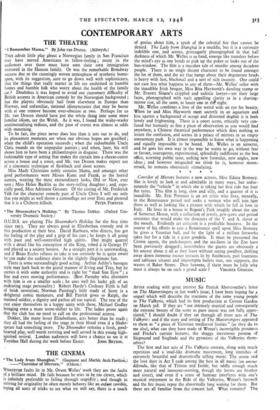THE CINEMA
"The Lady from Shanghai." (Gaumont and Marble Arch Pavilion.) —" Corridor of Mirrors." (Odeon.)
WHATEVER faults lie in Mr. Orson Welles' work they are the faults of a brilliant mind. He fails because he tries to bg,too clever, which is infinitely preferable to failing through stupidity ; and though in striving for originality he often merely behaves like an enfant terrible, trying all sorts of tricks to see what we will say, there is a touch
of genius about him, a spark of the celestial fire that cannot be
denied. The Lady from Shanghai is a muddle, but it is a curiously indelible one, and scenes, grotesquely photographed in that half
darkness of which Mr. Welles is so fond, emerge like transfers before the mind's eye as one bends to pick up the poker or looks out of the bus-window. The film is a macabre tale of murder among decadent people. There is no single decent character to be found amongst the lot of them, and the air that hangs about their degenerate heads is heavy with lust, blackmail and a sort of rich insanity. One could • not care less what happens to any of them—Mr. Welles' sailor with the inaudible Irish brogue, Miss Rita Hayivorth's dazzling tramp or Mr. Everett Sloane's crippled and sadistic lawyer—yet their large faces, photographed with such appalling clarity as in a shaving- mirror rise, all the same, to haunt one in thr night.
Mr. Welles combines a love of the weird with an eye for beauty. When he and Miss Hayworth meet secretly- in an aquarium and kiss against a background of octopi and distorted dogfish it is both lovely and frightening. There is a court scene, ethically very con- fused but humanly as fine a piece of observation as you would find anywhere, a Chinese theatrical performance which does nothing to lessen the confusion, and scenes in a palace of mirrors in an empty amusement park. It is almost impossible to know what is happening and equally impossible to be bored. Mr. Welles is an autocrat, and he- goes his own way in the way he wants to go, without fear or favour, courageous, experimental, splendidly indifferent to the box office, scorning public taste, seeking new formulas, new angles, new ideas ; and however misguided we think he is, however moon- struck, he remains obstinately stimulating.
* *
Corridor of Mirrors features a new actress, Miss Edana Romney. She is lovely to look at and admirable in many ways, but unfor- tunately the "vehicle " in which she is taking her first ride has four flat tyres. This film is long, slow and silly, and a quarter of it is inaudible. Mr. Eric Portman is an art critic who lives, mentally, in the Renaissance period and seeks a woman who will join him there as well as looking like a picture with which he fell in love in Italy. He lives in a house in Regent's Park roughly about the size of Somerset House, with a collection of jewels, gew-gaws and period costumes that would make the directors of the V. and A. slaver at the mouth. Evidently art criticism is a profitable business. In the course of his efforts to cast a Renaissance spell upon Miss Romney he gives a Venetian ball, and by the light of a million fireworks takes her for a ride in a giant gondola. It must be presumed the Crdwn agents, the park-keepers and the sea-lions in the Zoo have been previously drugged ' - nevertheless the guests are obviously a bit uneasy about it all as they leave without saying goodbye, drifting away down immense rococo terraces lit by flambeaux, past fountains and tableaux vivants and impromptu ballets into, one supposes, the wastes of Baker Street. Dear heavens, if there must be folly why
must it always be on such a grand scale ? VIRGINIA GRAHAM.


































 Previous page
Previous page